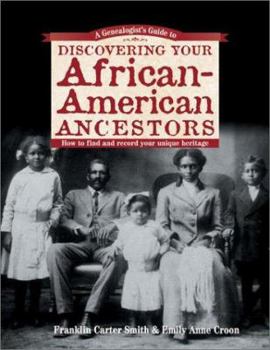A Genealogist's Guide to Discovering Your African-American Ancestors: How to Find and Record Your Unique Heritage
Select Format
Select Condition 
Book Overview
How do you approach the unique challenges of African-American genealogy? How can you make the most of your research time and effort? Join expert genealogists Franklin Carter Smith and Emily Anne Croom... This description may be from another edition of this product.
Format:Paperback
Language:English
ISBN:1558706054
ISBN13:9781558706057
Release Date:January 2003
Publisher:Betterway Books
Length:250 Pages
Weight:1.50 lbs.
Dimensions:0.7" x 8.5" x 11.1"
Customer Reviews
2 ratings
A must have
Published by Thriftbooks.com User , 17 years ago
This book is so informative that I have also given it as a gift. The case studies were great. I was able to conduct more systematic research after reading this book.
First-rate entry in a very good series . . .
Published by Thriftbooks.com User , 20 years ago
The volumes in Betterway's "Genealogist's Guide" series have been genrally excellent in leading researchers through the special problems, situations, and resources connected with non-Anglo-European-male ancestors. Anyone, even an otherwise experienced family historian, who has attempted to develop a black lineage more than three or four generations back in the United States knows the historical and social problems involved often are considerable - but they aren't insurmountable, as the authors show. Smith, a Houston librarian with legal training, learned early of the reluctance of his elderly relatives to discuss the "slave days" and of the tendency of black genealogists to end their quest with the 1870 census. He begins with the basics, the stuff we all learned (or should have) in the first year of research, but slants it toward the necessities of African-American history, including the need to deal with frequent name-changes, "consulting the elders," and evaluating family stories (both of which are especially important here). Likewise, in reading the federal census schedules, one must understand what was meant, both officially and locally, by "colored" and "mulatto," the definitions of which changed over time. Military service records, an important resource in most white pedigrees, are more problematic for black lineages before World War II. Church records are proportionately more important. Smith gives considerable space to the use of white (i.e., slaveholding) family records in tracing black families, and to the proper use of the federal census slave schedules -- subjects few of us have much experience with. Finally, he relates all this through three extended cases drawn from his own family research which exemplify the techniques and adjusted mind-sets he explained earlier. They're well written, carefully worked out, and inspirational as well as informative, and are worth the price of admission by themselves.




